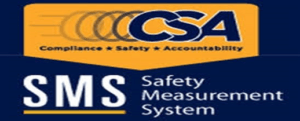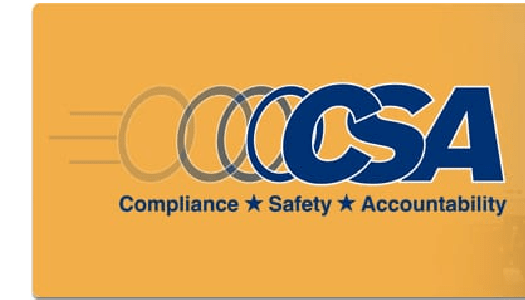Compliance, Safety, Accountability (CSA)

What is the CSA Program and its Purpose?
The Compliance, Safety, Accountability (CSA) program is run by the Federal Motor Carrier Safety Administration (FMCSA). It is designed to hold motorists, including owner-operators, accountable for their role in road safety. The FMCSA groups carriers with those who have a similar number of safety events and assigns each carrier a percentile risk. The safety data is held online in the FMCSA’s Safety Measurement System (SMS) and is updated monthly with new data from roadside inspections. The SMS data is organized into seven Behavior Analysis and Safety Improvement Categories (BASICs).
What Goes Into a CSA Score?
CSA scores are calculated with roadside inspection and crash report data from the SMS from the last 24 months. The calculations consider factors like crash severity, how long ago the event occurred, and annual vehicle miles traveled. Carriers receive a CSA score for each of the seven BASICs:
- Unsafe Driving BASIC – Operating a commercial vehicle in a dangerous manner, such as speeding, not wearing a seatbelt, or improper lane changing.
- Crash Indicator BASIC – Based on state-reported crash data, this BASIC contains historical patterns of frequency and severity of crash involvement.
- HOS Compliance BASIC – Operating a commercial vehicle when sick or fatigued and not maintaining records of duty status for six months.
- Vehicle Maintenance BASIC – Failing to properly maintain the commercial vehicle, such as improper load securement or faulty brakes or lights.
- Controlled Substance BASIC –
Operating a commercial vehicle under the influence of alcohol or illegal drugs.
Handling hazardous materials in an unsafe manner, such as having leaking containers and failing to label hazardous materials as such.
Driver Fitness BASIC – Operating a commercial vehicle by an unfit driver, such as lack of a valid CDL, and failing to maintain driver qualification files.
Do Drivers Have CSA Scores?
Drivers do not have their own CSA scores. CSA scores are assigned to carriers based on their DOT number. If a driver receives a violation, it is assigned to the carrier and not the driver. Drivers do have unique Pre-employment Screening Program (PSP) records with the FMCSA. A good practice for maintaining CSA scores is to check driver PSP records prior to hiring them and to only hire drivers who are honest about their driving records and have a track record of low-risk and responsible driving.
Where Can Carriers Check Their CSA Scores?
CSA scores for trucking companies can be checked online at https://www.fmcsa.dot.gov/. All that is needed is a DOT number. Scores are between 0 and 100, the lower the better – each violation adds points to your score. Some violations are a cut and dry point system, while others are calculated by the severity of or volume of the violation. After two years, violations are removed from you record.
To view additional data, including data not available to the public such as the Crash Indicator and Hazardous Materials Compliance BASICs, a carrier will need to login with their FMCSA-provided PIN. If you don’t have it, then you can request it at – https://cms8.fmcsa.dot.gov/registration/request-pin-number.
How Does a CSA Score Affect Your Business?
There are several ways that your CSA score can positively and negatively affect your business. Here are a few of the main ones:
Investigation and Intervention Risk – A poor CSA score may put you at a higher risk for FMCSA intervention and investigations. In extreme cases, this can result in an out-of-service order for your business.
Revenue – Shippers often look at the available data to help choose safe, reliable carriers. Poor scores can prevent a carrier from getting the most profitable loads.
Insurance – Insurance companies use BASIC scores in their evaluation of a carrier’s risk profile. Often, higher CSA scores lead to higher premiums and deductibles.
How to Improve the CSA Score?
If compliance, safety, and accountability are a genuine concern, then your trucking company will already have a system in place for checks and balances. This includes initial training, recurrent training, scheduled in-house inspections, preventative maintenance, checklists, and consequences for violations. The best way to improve your CSA score is to implement and maintain a system of checks and balances and use your current score as one of the ways in which you update your internal operations. Track which violations are most common – or which ones are on the rise. This will help you to determine the areas in which you need to improve, so that you can adjust your training accordingly. Once you understand how to answer the question – “What is the CSA Program?” you can begin to work on improving yours.
More useful tips to improve the CSA score –
- Use PSP Reports in your hiring. By using these reports, you can make intelligent hiring decisions and lower your crash rate by 8% and driver out-of-service rates by 17%, according to FMCSA data.
- Implement dual-facing dashcam solutions. Dashcams have a proven impact on accident reduction. They may prevent about 15% of accidents involving heavy duty trucks each year according to a recent study.
- Get proactive about vehicle maintenance. By using a pre and post-trip inspection tool that’s mobile, you can significantly improve the effectiveness of your inspections.
- Challenge incorrect violations. It is possible that incorrect or incomplete violations will be added to a CSA score at some point, so if this happens then challenge it.
- Use a weigh station bypass solution. Fewer weigh station pull ins means fewer inspections, and potentially fewer violations.
- Choose the right ELD solution. Many of the most common and costly violations are Hours of Service related. Choose ELDs that are easy to use, reliable and include document management.
Additional information regarding CSA Score Frequently Asked Questions can be found on the following sources:
Fleet Safety, “A Guide to Understanding and Improving Your CSA Score”, Elizabeth Vather, July 10, 2019.
FMCSA website – fmcsa.com
Thank you for reading “What is the CSA Program?”


